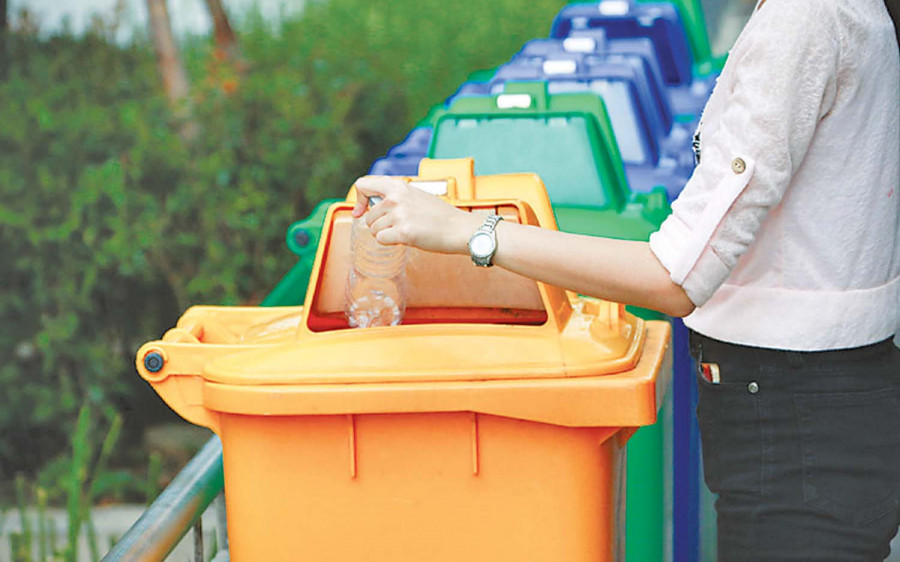Valley
Kathmandu’s compost bin plan offers little hope
Former officials and urban planners are sceptic as it is a tried, tested, and failed measure.
Anup Ojha
After failing to collect biodegradable and non-biodegradable solid wastes at source, the Kathmandu Metropolitan City has taken an alternative approach—distribute compost bins to households at subsidised rates.
The City announced its plan in a notice on Friday. The plan, aimed to promote segregation of waste at source, is the City’s latest move towards solving Kathmandu’s longstanding waste management problem. But it’s not a noble one; the City had adopted the same measure during former mayor Bidya Sundar Shakya’s tenure, but it didn’t meet its desired end. This gives room for scepticism as to whether the rehash of the tried-and-tested measure will work out this time. Experts the Post talked to are not convinced it will.
The plan, the brief notice states, is to sell compost bins at the rate of Rs1,500 apiece. Sarita Rai, chief of the KMC’s environment division, said the City is going to provide 850 compost bins in the first phase of the scheme, for which the City has spent Rs4 million. She said the actual price of the bin is Rs3,500 per unit.
“Anyone who lives in the metropolitan city can get the bin, but they should use it to make compost manure,” said Rai, adding that the goal is to motivate people to recycle the organic waste generated in their kitchen.
But the former chief of the City’s environment division Hari Bahadur Shrestha City said that approach alone can’t solve the garbage problem.
“I don’t think this is going to be a sustainable measure, because earlier also we had distributed compost bins giving subsidies of up to 70 percent,” said Shrestha, adding the City had then distributed around 30,000 compost bins to citizens during his tenure. “Until the City coordinates at the grassroots level and makes people aware of its goal, it can’t solve the garbage problem.”
Launching a garbage segregation programme in mid-July, Mayor Balendra Shah had asked City residents to segregate their solid waste at home. Mayor Shah had said solving Kathmandu’s garbage problem was his ‘first priority’. He said at the time that segregation was ‘not a difficult task’ and ‘not mixing the bio-degradable and non-biodegradable waste’ would be enough to manage the garbage problem.
The City had officially announced that it’d collect segregated waste, especially from the core areas, including wards 12, 17, 18, 19, 20, 21, 23, 24, 25, and 27 of the metropolitan city.
Even though many people trusted the mayor’s move and kept segregating their waste at home, the City began collecting them by mixing them together.
“It appears that Mayor Balendra Shah is more into pleasing the crowd, rather than doing anything substantial to solve the garbage problem,” said Shrestha. “Because it’s not as easy as he claimed earlier.”
After winning the mayoral election in May, Mayor Shah drew attention at the oath-taking ceremony as he refused to accept khada and tika. He said he wouldn’t accept them until Kathmandu’s waste management issue is solved.
“That was just tall talk,” Shrestha, the former chief of City’s environment division, said. “Instead of solving the garbage problem, he went on to demolish the squatter settlements without proper planning or coordinating with state security agencies.”
Urban planners, too, are sceptical of the promises the new mayor has made to the city’s residents.
“The City should assure its residents that it can really make a difference,” said urban planner Suman Maher Shrestha. “The City can solve the garbage problem only with an integrated method. For that, it needs to do homework and a lot of paperwork.”
He said the reason behind Shah not being successful in his mission is the lack of a proper system in our bureaucracy.
Earlier, in 2016, the KMC had established a bioplant in Teku to convert waste into energy, terming it one of the best ways to manage Kathmandu’s solid waste. The City had aimed to produce 14KW of electricity, 300 kg of organic fertiliser and 13,500 litres of water daily from three metric tonnes of organic material.
But that project, too, failed.
The project was built with a joint investment of Rs18.2 million by the KMC and the European Union (EU).
Sunil Lamsal, an engineer and waste management consultant at the mayor’s secretariat, defends the City’s latest moves.
“Things are different now, we have been working hard to solve the waste problem with alternative plans for organic waste management,” he said. “We have been constantly looking for spaces to convert organic waste to manure, but we are not getting it.”
Lamsal blamed the central government for the City’s failure to perform up to the mark. “The problem has risen because of a lack of better coordination of the central government,” Lamsal said. “But, in a month you will be hearing good news, because we have worked on plan B. Our team is determined to solve the garbage issue.”




 9.7°C Kathmandu
9.7°C Kathmandu.jpg)














